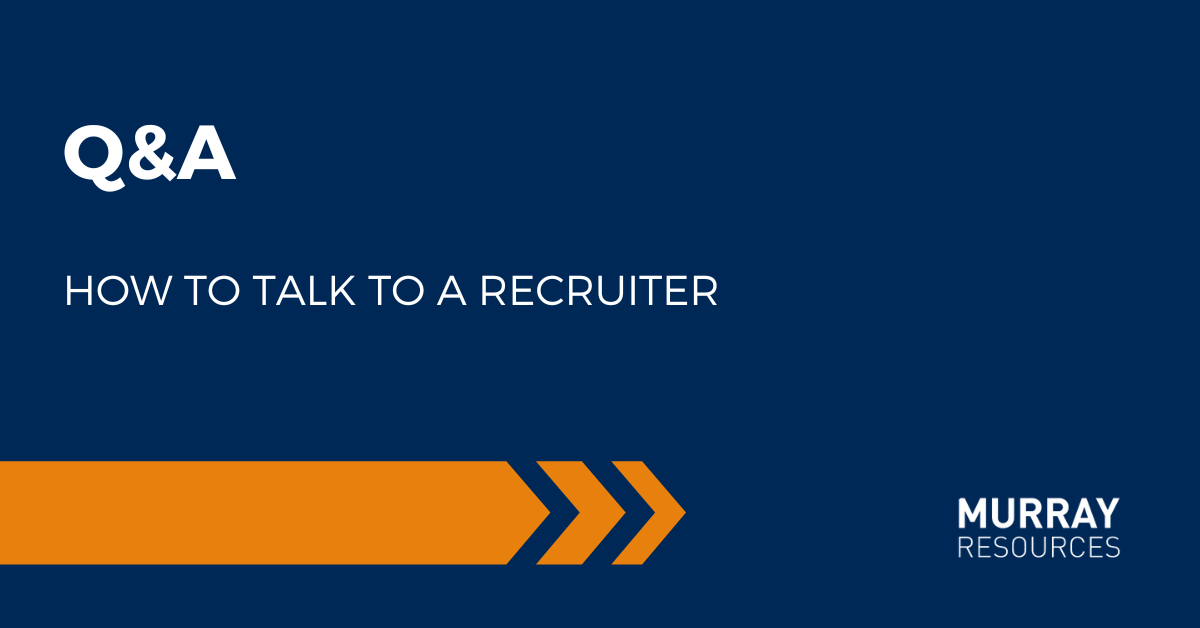How to Talk to a Recruiter: What to Share to Get the Job You Really Want
November 26, 2025

Every job search has moving parts—applications, job descriptions, interviews, and decisions that often happen behind the scenes. A recruiter helps bring clarity to all of that, offering insight into opportunities, expectations, and what hiring managers are truly looking for. But the most successful experiences happen when job seekers treat the relationship as a genuine partnership.
When you’re open about what you want—your priorities, the company culture where you thrive, the job titles you’re targeting—it gives your recruiter the context they need to advocate for you with accuracy and confidence. In return, you get a clearer path through the job hunt and a better understanding of where your experience can shine.
At Murray Resources, we believe candidates deserve that level of support. Our goal is to make the job search process more transparent, more human, and more aligned to your long-term goals. The right conversations can make all the difference, and knowing what to share is the first step.
Below, we break down the information that helps a recruiter champion your search—and how those conversations can help you get closer to the job you really want.
Key Takeaways
- The clearer you are about your goals, the more effectively your recruiter can advocate for you.
- Recruiters translate your experience in ways that resonate with potential employers.
- Sharing the right information leads to better alignment, stronger interview prep, and more meaningful opportunities.
Why Communication Helps Your Recruiter Support You More Effectively

When you’re working with a recruiter, the information you share directly shapes how they support you. Clear, consistent communication helps them understand what you want, what you’re great at, and where you’ll thrive—so they can advocate for you confidently throughout the interview process and across every opportunity that comes your way.
🔑 Intentional Communication Gives Staffing Agencies Clarity in 3 Key Areas:
1. Roles that Would be a Good Fit
Sharing your strengths, preferred job titles, and the type of work that energizes you helps your recruiter identify roles that align with both your experience and your goals—not just what appears on paper. This clarity also helps them keep an eye out for future opportunities that match where you want your career to go, including the roles that bring you closer to your dream job.
2. Where You’ll Thrive long-term
Your preferences around company culture, work style, leadership style, and career direction give your recruiter the insight they need to match you with environments where you can grow, contribute, and feel supported. When they know what motivates you—and what slows you down—they can filter out companies that don’t align and focus on the ones that do.
3. How to Advocate for You Effectively
When your recruiter understands what makes you stand out, they can communicate your value confidently to hiring managers, message recruiters or HR teams on your behalf, and provide targeted guidance as you move through the interview process. This level of clarity strengthens how they position you in early conversations and can even influence the quality of the job offers you receive.
🔹Tip: When these pieces are clear, your job search becomes more focused, strategic, and collaborative—exactly what a strong recruiter–candidate partnership should feel like! Ready to take the next step in your search? Submit your resume and get in contact with the Murray Resources team.
How Potential Employers Evaluate You for a Position— And How Recruiters Can Elevate Your Story

Hiring managers and HR teams look at much more than technical skills when evaluating candidates. They’re trying to understand how you think, communicate, and contribute within a team. A good recruiter helps bring these qualities forward in a way that’s clear and compelling.
- How Your Experience Connects to the Role: Your recruiter can translate your background into the context of the job description, helping hiring managers quickly understand how your responsibilities, achievements, and strengths align with what the role needs.
- The Strengths That Make You a Strong Candidate: Recruiters highlight the skills and accomplishments that matter most for the role title, helping employers immediately recognize the value you bring.
- Your Communication and Collaboration Style: How you work with others is often just as important as what you know. Your recruiter helps hiring managers understand your approach to teamwork, problem-solving, and day-to-day communication.
- What Motivates and Drives You: Employers want to know what keeps you engaged and performing at your best. When your recruiter can share what motivates you, it becomes easier for hiring managers to envision where you’ll thrive.
- Your Fit Within the Company’s Culture: Culture fit is about alignment—not sameness. Your recruiter helps hiring managers see how your values and work style connect naturally with the organization’s environment and expectations.
- Why You Stand Out: Every hiring process involves comparison. Your recruiter brings attention to the qualities, experiences, and strengths that differentiate you, helping employers see the potential beyond your resume.
📌 Remember: when these pieces are clear, hiring managers get a fuller, more human understanding of what you bring—and why you’re someone worth meeting.
What to Share With Your Recruiter (And Why It Matters)

The more clarity you provide, the easier it becomes for your recruiter to identify roles that genuinely align with your goals. Here’s what to think through:
🌟 The Type of Work You Actually Enjoy
Your recruiter needs to understand what energizes you—not just what you can do, but what you want to spend more time doing in your next position. This context shapes the type of job posting they recommend and the way they position you to a potential employer.
Ask yourself:
- What tasks or responsibilities do I naturally gravitate toward?
- Which past accomplishments felt meaningful—not just routine?
- What kind of work do I want to do more of (or less of) moving forward?
Examples here might include leading projects, managing financial reporting, driving digital marketing strategy, collaborating with technical teams, or building client relationships. The work that excites you is often the work where you’ll thrive long-term—and your recruiter uses that insight to guide your search.
🌟 Your Preferred Work Environment
How you work best matters just as much as the work itself. Be clear about the environments where you do your strongest, most focused work.
Share whether you prefer:
- Remote
- Hybrid
- In-office
💭 And then go a layer deeper: Do you thrive with collaboration? Quiet focus time? Clear structure? Fast-paced teams? These details help staffing agencies match you with the company cultures and work styles where you’ll feel supported—not stretched thin.
🌟Industries You’re Interested In (and Have Experience In)
If there are specific industries you’re drawn to—or ones where you already have meaningful experience—sharing that with your recruiter early on helps guide your search with intention. Your preferences give staffing agencies a clearer understanding of the type of work, pace, and company environment where you’re most likely to thrive.
Even if you’re exploring several directions, communicating both your interests and your experience allows your recruiter to focus on the potential employers and company environments that align best with your goals and strengths.
🌟 Salary Range
Being transparent about your salary range helps your recruiter focus on opportunities that truly align with your expectations. It also prevents you from moving through full time job interviews for roles that won’t meet your needs in the long run.
Your recruiter’s job isn’t just to connect you with openings; it’s to help you understand where your compensation expectations fit within the current market. They can offer insight into salary trends, how your skills compare to what potential employers are looking for, and how different company environments influence pay ranges. Clear communication upfront leads to better alignment, fewer surprises, and more productive conversations throughout your search.
🌟 Skills, Tools, and Certifications
Sharing the skills, tools, and certifications you’re confident in gives your recruiter the information they need to present you accurately and competitively. This includes platforms you use daily, technical tools you’ve mastered, certifications you’ve earned, and any specialized experience that helps you stand out as a strong candidate.
The more specific you are, the more effectively your recruiter can highlight your strengths during conversations with hiring managers—and match you with roles where your abilities will make an immediate impact.
🌟 Strengths You Want Highlighted
If there are strengths you feel define your work—whether that’s leadership experience, strategic thinking, financial analysis, digital marketing expertise, project ownership, technical depth, or relationship-building—share them openly. These core strengths help shape how you show up as a candidate.
When your recruiter knows what you want emphasized, they can present your value proposition in a way that resonates with a potential employer. It ensures the qualities you’re most proud of are front and center during early conversations, giving hiring managers a clearer sense of the impact you bring to a role.
How the Right Information Elevates Your Job Search Process
When your recruiter has a clear understanding of your goals, preferences, and career direction, every part of your job search becomes more focused and intentional.
- More aligned: You’re only presented with opportunities that match your strengths, interests, and long-term goals.
- More strategic: Your interview prep is shaped around what matters most to you, helping you show up with clarity and confidence.
- More efficient: You avoid roles that don’t meet your needs or expectations, saving time and reducing unnecessary steps.
- More supported: Your recruiter can guide your communication, follow-up, and application process more accurately.
- More successful: You move forward with positions that genuinely reflect your experience, values, and aspirations.
When your recruiter has the right information, they’re not just matching you with a job—they’re helping you find the right job.
A Few Tips to Start Applying Today
If you’re ready to move your search forward, here are quick steps that make your applications sharper and more intentional:
- Write down three job titles you’re excited about
- List the responsibilities you want more of—and less of
- Think about the company culture where you’ve thrived
- Clarify your non-negotiables
- Send a LinkedIn message or schedule a brief chat to start connecting with a third party recruiter
🏆 Bonus: Explore our full list of tips for working with recruiters, and check out our page of helpful job seeker resources!
Summary
Working with a recruiter is most powerful when it feels like a partnership. The more honestly you communicate about what you want—your ideal company culture, the type of work that energizes you, your salary range, and where you hope your next job will take you—the more precisely a recruiter can match you with the right opportunities. They’re here to help you navigate the application process, prepare for interviews, and stand out to potential employers in a way that feels authentic and confident.
At Murray Resources, our goal is to champion your search from every angle. If you’re ready to move forward with clarity and support, we’re here to help you take the next step toward the job you really want! View job openings, or get started by submitting your resume.
Q&A

Q: What’s the best way to make a good impression during my first contact with a recruiter?
A: Keep it simple, professional, and honest. A short message or direct contact—whether through email or LinkedIn—goes a long way. Share your relevant experience, the position you’re interested in, and a brief value proposition about why you’d be a good candidate. You don’t need a perfect cover letter for this stage; you just need clarity and genuine interest. Think of it as starting a conversation, not pitching yourself.
Q: How can a recruiter help me prepare for job interviews?
A: Interview prep is one of the most valuable parts of working with a recruiter. They can walk you through the interview process, offer feedback on your resume, and help you practice how to talk about your skills, accomplishments, and company culture preferences. A recruiter knows what the potential employer is looking for, which means they can help you speak to the role title more confidently than other candidates.
Q: I’m applying for a full time job. Should I include my salary range early?
A: You can share a general salary range with your recruiter—this keeps your job application aligned with the right opportunities. With a potential employer, wait until the next step or let the recruiter guide the timing. They understand the hiring process and can help position your expectations in a way that supports stronger job offers.
Q: What if I apply and don’t hear back from the HR person or employer right away?
A: It’s normal. People are busy, inboxes fill up, and hiring teams are juggling multiple candidates. A polite follow up after a reasonable wait time shows professionalism and interest without being pushy. If a recruiter is representing you, they’ll often handle the follow up and help you move forward in the process more efficiently.
Q: How do I know if I’m the right person for a role when the job description isn’t totally clear?
A: This is where research—and a recruiter—make all the difference. Look beyond the job description and consider the company culture, the skills emphasized, and the responsibilities that stand out. Your recruiter can help decode the position, offer examples of what employers prioritize, and help you determine whether the role is a good fit before you apply.
Q: Any other tips for standing out when hiring teams are comparing candidates?
A: Be clear, be prepared, and be human. Show that you understand the company, can speak confidently about your skills, and bring enthusiasm to the interview. A firm handshake isn’t the deciding factor—but authentic interest, thoughtful questions, and a strong value proposition absolutely set you apart from other candidates.
Work with a Houston Recruiter Who Will Advocate for You
If you’re serious about landing your next opportunity, make sure you’re giving your recruiter the right tools to help you succeed. At Murray Resources, we work closely with candidates to match them with roles that align with their goals, skills, and preferences—but we need you to be specific.
Not sure where to begin? Take a look at our current job openings or contact us today to start a focused conversation about your next move.
